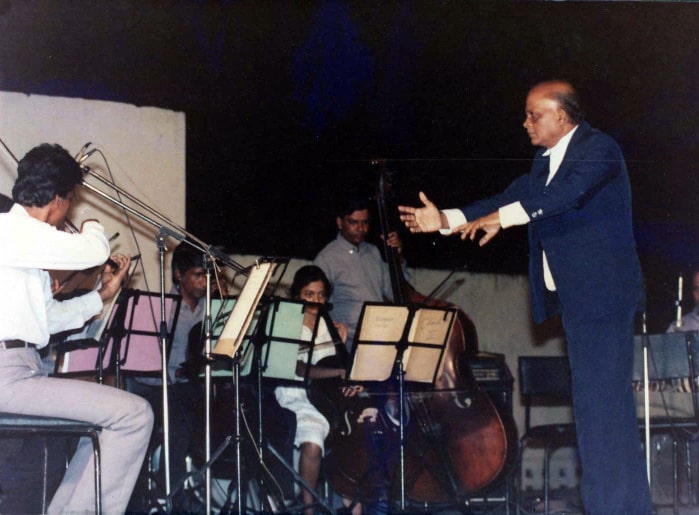
“Khemadasa who has embedded his mark in several of his creations during the past five decades is from Talpitiya, Wadduwa and entered the portals of Colombo city in search of music, the type of music he was looking for in the city,” Image: the Master in action
by Susitha R. Fernando
(January 27, Negombo, Sri Lanka Guardian)
If Dr. Lester James Peries is the Father of Sri Lankan cinema, Dr.
Premasiri Khemadasa should be named as the ‘Father’ of local film music.
This in fact would be a fitting tribute to Premasiri Khemadasa better
known as ‘Master Khemadasa’ who turned 71 last Friday, January 25.
Still very much active with making music for teledramas, films and even ‘opera’ the one and only man who was dared experiment and create the world renowned style of musical expression from this part of the world. Swimming against the tide at a time when film music meant, directly copying Bollywood and South Indian film songs and tunes, Khemadasa introduced a style of music for popular as well as artistic cinema.
Starting with Sirisena Wimalaweera ‘Rodee Kella’ his musical contribution to Lester James Peiris` Golu Hadawatha was a turning point in cinematic music in the Sri Lankan music industry. Later his music in films like Lester James Peiries’ “Nidhanaya”, “Kaliyugaya” and Dharmasena Pathiraja’s “Bambaru Avith” acclaimed as landmarks in the history of local film music in the country.
Khemadasa who has embedded his mark in several of his creations during the past five decades is from Talpitiya, Wadduwa and entered the portals of Colombo city in search of music, the type of music he was looking for in the city.
Born on January 25, 1937 and had his education at Sri Sumangala Vidyalaya and St. John`s College, Panadura. As a teenager, he became a gifted flutist. Khemadasa was asked to come to Radio Ceylon for an interview on the day he was scheduled to take his Senior School Certificate examination. He finished the examination much ahead of time, jumped out of the school wall and travelled to the audition. He passed the audition and became a member of Radio Ceylon. Apart from film music Dr. Khemadasa has composed music for teledramas, theatre. Further he is an artiste a musical innovator a composer who had more than any other striven to extend the boundaries of Sri Lankan music explored the uncharted world of new sounds new rhythms under the name of ‘Symphonies’ and ‘opera’ words that were alien to Sri Lankan music.
Fusing the best of our folk heritage, Indian classical ragas and the Western musical tradition, he composed symphonies like ‘Muhuda’ and ‘Mage Kale Mavni’. He shot to fame with his ‘Manasawila’, opera. This followed with several other productions such as ‘Doramandalawa’, ‘Sonduru Warnadasa’ and latest being ‘Agni’ (Fire), based on the legend of Prometheus, an Olympian god who bequest human provided the spark to ignite knowledge, enlightenment.
The presence of operatic vocals in his music is explained by his vast knowledge of opera and Khemadasa is the only known Sri Lankan musician who practises and creates opera. In his operas he has tried and succeeded in capturing the meaning of the words using voice. The fact that his operas are written in Sinhalese makes them unique. Khemadasa has many students whom he uses in his operas and majority of them unearthed musical talents miles and miles away from the capital Colombo and trained and guided to the international standards by the Master.
He has come a long way over at least five decades enriching theatre, ballet, symphony and the Sinhala film industry from his humble contribution. Not haiing studied music theories from traditional schools but experiment and experience, Master Khemadasa was bestowed the coveted honorary doctorate (D.Litt) by the Ruhunu University for his contribution to music.
Though lately Master fell ill, after a long layoff following a kidney transplant he returned to create music for the country. Even at the age of 71, he perseveres in his field as a giant, trying to secure the future of Sri Lankan music.
A straightforward man who never took anything for granted but worked hard in the field and kept his head high with what he believed musically or politically, we all say ‘Thankyou’ to the Master for those melodies and music.
http://www.srilankaguardian.org/2008/01/master-thank-you-for-music.html
-
Recent Posts
Recent Comments
Archives
Categories
Meta